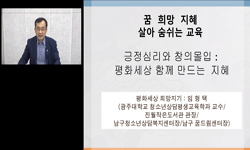This study explored the components of positivity that help adult Koreans maintain a positive attitude toward the self and the society. Taking multiple perspectives was conceptualized as a core characteristic of positivity that enables one to find mean...
http://chineseinput.net/에서 pinyin(병음)방식으로 중국어를 변환할 수 있습니다.
변환된 중국어를 복사하여 사용하시면 됩니다.
- 中文 을 입력하시려면 zhongwen을 입력하시고 space를누르시면됩니다.
- 北京 을 입력하시려면 beijing을 입력하시고 space를 누르시면 됩니다.

역경 극복을 돕는 성인 한국인의 긍정성 탐색: 긍정적 태도 척도 개발과 타당화 = Exploring the Components of Positivity among Adult Koreans: Development and Validation of a Positive Attitude Scale
한글로보기https://www.riss.kr/link?id=A104030925
-
저자
현경자 (우리사회복지연구소)
- 발행기관
- 학술지명
- 권호사항
-
발행연도
2009
-
작성언어
Korean
-
주제어
positive psychology ; positive attitude ; taking multiple perspectives ; self positivity ; self-acceptance ; self-control ; self-esteem ; social positivity ; social adaptation ; acceptance of society ; scale development ; 긍정심리 ; 긍정적 관점 ; 자기긍정성 ; 사회긍정성 ; 관점 다각화 ; 사회적응 ; 사회수용 ; 자기수용 ; 자기조절 ; 자기존중감 ; 희망감 ; 긍정적 태도 척도 ; 타당도
-
등재정보
KCI등재
-
자료형태
학술저널
- 발행기관 URL
-
수록면
13-42(30쪽)
-
KCI 피인용횟수
37
- DOI식별코드
- 제공처
- 소장기관
-
0
상세조회 -
0
다운로드
부가정보
다국어 초록 (Multilingual Abstract)
This study explored the components of positivity that help adult Koreans maintain a positive attitude toward the self and the society. Taking multiple perspectives was conceptualized as a core characteristic of positivity that enables one to find meanings in and/or to create meanings for the self and the society in which one lives. Thus positive cognitive tendencies such as taking multiple perspectives were hypothesized to promote self-acceptance, self-belief, self-control, adaptation to and acceptance of the society. Based on these conceptualizations of individuals' positivity, preliminary scale items were constructed, and development and validation of a positive attitude scale was attempted, using 352 college students and 401 adults. As expected, results of exploratory factor analyses revealed 6 factors, which were named as multiple perspectives, self-acceptance, self-belief, self-control, social adaptation, and acceptance of society. Among these factors, however, self-belief factor was excluded because its items were found to be loaded with other factors as well, and because results of confirmatory factor analyses supported 5 factors model better than the other one. The final 5 factor scale was found to be reliable in terms of internal consistency and test-retest reliability, and to be significantly correlated with similar positive traits of the self as well as with psychosocial well-being variables in an expected direction, suggesting that the scale has good construct and predictive validity. As for incremental validity, positive attitude scale augmented prediction of positive emotion and stress-related reactions beyond a self-esteem measure. Finally, implications and limitations of this study were discussed, and future directions for this line of research were suggested.
국문 초록 (Abstract)
이 연구는 역경에서나 일상생활에서 도움이 되는 성인 한국인의 긍정성을 탐색하고 그 구성개념에 따라 긍정적 태도 척도를 개발하여 타당화 작업을 시도하였다. 본 연구에서는 개인의 긍...
이 연구는 역경에서나 일상생활에서 도움이 되는 성인 한국인의 긍정성을 탐색하고 그 구성개념에 따라 긍정적 태도 척도를 개발하여 타당화 작업을 시도하였다. 본 연구에서는 개인의 긍정성을 자신과 자기가 속한 사회를 다각도로 살펴 긍정적 측면에 주목하고 의미를 부여하는 인식성향과 그에 따른 긍정적 태도로 규정하였다. 한국인의 긍정성은 긍정적 관점, 자기긍정성, 사회긍정성으로 구분될 수 있고, 구체적으로 긍정적 시각을 촉진하는 관점의 다각화, 자기수용, 자기소신, 자기조절, 사회적응, 사회수용과 같은 특성을 보일 것으로 가정하였다. 이론추출 방식과 경험적 연구결과를 토대로 척도문항들을 선정하였으며, 서울과 대구지역의 대학생 373명과 일반 성인 401명을 대상으로 요인분석을 실시한 결과 이론적 예측과 일관되게 6개 요인이 추출되었다. 하지만 이중 자기소신 요인은 해당 문항들에서 타 요인에 중복 부하된 것이 많이 있었고, 확인적 요인분석을 통해 5요인의 적합도가 6요인보다 우수하게 나타나 요인의 순수성과 척도의 간명성을 위해 제작과정에서 제외되었다. 최종적으로 긍정적 태도 척도는 긍정관점 요인 1개(다각화), 자기긍정성 요인 2개(자기수용, 자기조절), 사회긍정성 요인 2개(사회적응, 사회수용)로 구성되었다. 제작된 척도의 구성타당도, 내적합치도 및 구인, 예측, 증분 측면에서의 타당도는 적절하게 나타났다. 예측대로 이 척도는 자존감, 희망감 등의 긍정적인 자기특성 변수들과 유의미한 정적 상관을 보였고, 심리사회적 안녕 변수들과도 유의미한 상관을 나타냈으며, 긍정적 정서 및 스트레스 관련 변수들에 대한 자존감의 효과를 통제하고도 긍정적 태도의 설명력이 유의미하게 증가됨을 보여주었다. 끝으로 본 연구의 이론적, 임상적 의의와 제한점, 후속연구 방향을 제언하였다.
참고문헌 (Reference)
1 조긍호, "한국인 이해의 개념 틀" 나남출판 2003
2 최상진, "한국인 심리학" 중앙대학교 출판부 2000
3 차경호, "한국 성인의 자존감 구성요인 탐색 및 척도개발" 한국심리학회 25 (25): 105-139, 2006
4 박병기, "주관적 안녕 척도의 개발 및 타당화" 한국교육심리학회 18 (18): 159-175, 2004
5 이홍철, "정서상태가 기억수행 및 주의편향에 미치는 효과" 고려대학교 1994
6 현경자, "저소득층 부부들의 경제적 스트레스와 부부갈등 및 결혼결과:탄력적 대응을 돕는 기혼자의 자기해석" 한국사회및성격심리학회 22 (22): 49-79, 2008
7 김명소, "심리적 안녕감의 구성개념분석:한국 성인 남녀를 대상으로" 15 (15): 19-39, 2001
8 조혜자, "사회경제적 변화가 가족에게 미치는 영향" 3 (3): 1-16, 1998
9 박선영, "배우자폭력 여성 피해자의 긍정성과 역기능성에 대한 해결중심 개별상담의 효과 연구" 한국가족복지학회 13 (13): 5-27, 2008
10 현경자, "기혼남녀의 자기관리 결혼만족의 관계-독립 및 상호의존적 자기관을 중심으로-" 한국사회복지학회 56 (56): 239-268, 2004
1 조긍호, "한국인 이해의 개념 틀" 나남출판 2003
2 최상진, "한국인 심리학" 중앙대학교 출판부 2000
3 차경호, "한국 성인의 자존감 구성요인 탐색 및 척도개발" 한국심리학회 25 (25): 105-139, 2006
4 박병기, "주관적 안녕 척도의 개발 및 타당화" 한국교육심리학회 18 (18): 159-175, 2004
5 이홍철, "정서상태가 기억수행 및 주의편향에 미치는 효과" 고려대학교 1994
6 현경자, "저소득층 부부들의 경제적 스트레스와 부부갈등 및 결혼결과:탄력적 대응을 돕는 기혼자의 자기해석" 한국사회및성격심리학회 22 (22): 49-79, 2008
7 김명소, "심리적 안녕감의 구성개념분석:한국 성인 남녀를 대상으로" 15 (15): 19-39, 2001
8 조혜자, "사회경제적 변화가 가족에게 미치는 영향" 3 (3): 1-16, 1998
9 박선영, "배우자폭력 여성 피해자의 긍정성과 역기능성에 대한 해결중심 개별상담의 효과 연구" 한국가족복지학회 13 (13): 5-27, 2008
10 현경자, "기혼남녀의 자기관리 결혼만족의 관계-독립 및 상호의존적 자기관을 중심으로-" 한국사회복지학회 56 (56): 239-268, 2004
11 김동직, "개별성-관계성 척도의 제작과 타당화 연구" 12 (12): 71-93, 1998
12 Osteen, J, "Your best life now" Warner Faith 2005
13 McCrae, R. R, "Validation of the five-factor model of personality across instruments and observers" 52 : 81-90, 1987
14 Snyder, C, "The will and the ways:Development and validation of an individual differences measure of hope" 60 (60): 570-585, 1991
15 Higgins, E, "The self-digest:Self-knowledge serving self-regulatory functions" 71 : 1062-1083, 1996
16 Scheier, M. F, "The self- consciousness scale:A revised version for use with the general population" 15 : 687-699, 1985b
17 Banaji, M. R, "The self in social contexts in Annual Review of Psychology" Annual Reviews 297-332, 1994
18 Baumeister, R. F, "The self in The handbook of social psychology" McGraw Hill 680-740, 1998
19 Byrne, R, "The secret" Atria Books/ Beyond Words 2006
20 Steele, C. M, "The psychology of self-affirmation:Sustaining the integrity of the self in Advances in experimental social psychology" Academic Press 261-302, 1988
21 Judge, T. A, "The job satisfaction- job performance relationship:A qualitative and quantitative review" 87 (87): 765-780, 2001
22 DeLongis, A, "The impact of daily stress on health and mood:Psychological and social resources as mediators" 54 (54): 486-495, 1988
23 Harter, S, "The determinant and mediational role of global self-worth in the children in Contemporary topic of developmental psychology" Wiley 219-224, 1986
24 Crocker, J, "The costly pursuit of self-esteem" 130 (130): 392-414, 2004
25 Buss, A. H, "The aggression ques-tionnaire" 63 : 452-459, 1992
26 Rosenberg, M, "Society and the adolescent self-image" Princeton University Press 1965
27 Tafarodi, R. W, "Self-liking and self-competence as dimensions of global self-esteem:Initial validation of a measure" 65 : 322-342, 1995
28 Brown, L, "Self-esteem index" Pro-Ed 1991
29 Bandura, A, "Self-efficacy:Toward a unifying theory of behavioral exchange" 84 : 191-215, 1977
30 Higgins, E, "Self-discrepancy:A theory relating self and affect" 94 : 319-340, 1987
31 Scheier, M. F, "Self-awareness and physical aggression" 10 : 264-273, 1974
32 DeVellis, R, "Scale development:Theory and applications" SAGE Publications 1991
33 Derogatis, L. R, "SCL-90(Revised) manual I. Clinical Psychometrics Research Unit" Johns Hopkins University, School of Medicine 1983
34 Raykov, T, "Reporting structural equation modeling results in Psychology and Aging:Some proposed guidelines" 6 (6): 499-503, 1991
35 Kline, R. B, "Principles and practice of structural equation modeling" Guilford Press 1998
36 Ryff, C. D, "Possible selves in adulthood and old age:A tale of shifting horizons" 6 (6): 286-295, 1991
37 Scheier, M. F, "Optimism, coping, and health:Assessment and implications of generalized outcome expectancies" 4 : 219-247, 1985
38 Carson, S. H, "Mindfulness and self-acceptance" 4 (4): 29-43, 2006
39 Burpee, L. C, "Mindfulness and marital satisfaction" 12 (12): 43-51, 2005
40 Brown, J, "Mindfulness and intelligence:A comparison" 25 (25): 305-335, 1990
41 Langer, E. J, "Mindful learning" 9 (9): 220-223, 2000
42 Fischer, J, "Measures for clinical practice:A source book" The Free Press 1994
43 Langer, E. J, "Matters of mind:Mindfulness/ mindlessness in perspective" 1 (1): 289-305, 1992
44 Brockner, J, "Low self-esteem and behavior plasticity:Some implications for personality and social psychology in Review of personality and social psychology" SAGE Publications 237-271, 1984
45 Seligman, M. P, "Learned optimism" Knopf 1991
46 Heine, S, "Is there a universal need for positive self-regard?" 106 (106): 766-794, 1999
47 DeJong, P, "Interviewing for solutions" Brooks/Cole 2002
48 Taylor, S. E, "Illusion and well-being:A social psychological perspective on mental health" 103 : 193-210, 1988
49 Ryff, C. D, "Happiness is everything, or is it? Explorations on the meaning of psychological well-being" 57 : 1069-1081, 1989
50 Walsh, F, "Guilford PressStrengthening family resilience" Guilford Press 1998
51 Gorsuch, R. L, "Factor analysis" Erlbaum 1983
52 Snyder, C, "Development and validation of the state hope scale" 70 (70): 321-335, 1996
53 Hu, L. T, "Cutoff criteria for fit indexes in covariance structure analysis:Conven- tional criteria versus new alternatives" 6 : 1-55, 1999
54 Markus, H, "Culture and the self:Implications for cognition, emotion, and motivation" 98 : 224-253, 1991
55 Hyun, K. J, "Culture and the self:Implications for Koreans' mental health" University of Michigan 1995
56 Fredrickson, B. L, "Cultivating positive emotions to optimize health and well-being" 3 : 1-24, 2000
57 Rosenberg, M, "Conceiving the self" Basic Books 1979
58 Seligman, M. P, "Authentic happiness:Using the new psychology to realize your potential for lasting fulfillment" Arthur Pine Associates 2002
59 Carver, C. S, "Attention and self-regulation:A control theory approach to human behavior" Springer-Verlag 1981
60 Kaiser, H. F, "An index of factorial simplicity" 39 : 31-36, 1974
61 Crown, D. P, "A new scale of social desirability independent of psychopathology" 4 : 349-354, 1960
62 Marsh, H. W, "A multidimensional, hierarchical model of self-concept:Theoretical and empirical justification" 2 (2): 77-172, 1990
63 한유화, "2요인 자아존중감 척도: 개인주의적 및 집단주의적 요인" 한국사회및성격심리학회 21 (21): 117-131, 2007
동일학술지(권/호) 다른 논문
-
비행청소년의 범죄유형에 따른 재범 위험성 차이에 관한 연구 -비행촉발요인 조사서와 PAI 검사결과를 중심으로-
- 한국사회및성격심리학회
- 이남희
- 2009
- KCI등재
-
Where are you from? 지역 고정관념에 따른 언어 기대 편파(LEB): 언어 범주화 모델(LCM)을 중심으로
- 한국사회및성격심리학회
- 박상희
- 2009
- KCI등재
-
- 한국사회및성격심리학회
- 차운아
- 2009
- KCI등재
-
욕구충족 및 통제감 지각이 생애후기 성인의 대인애착 성향에 미치는 영향과 애착 선행변인
- 한국사회및성격심리학회
- 이주일
- 2009
- KCI등재
분석정보
인용정보 인용지수 설명보기
학술지 이력
| 연월일 | 이력구분 | 이력상세 | 등재구분 |
|---|---|---|---|
| 2020 | 평가예정 | 계속평가 신청대상 (등재유지) | |
| 2015-01-01 | 평가 | 우수등재학술지 선정 (계속평가) | |
| 2011-01-01 | 평가 | 등재학술지 유지 (등재유지) |  |
| 2009-01-01 | 평가 | 등재학술지 유지 (등재유지) |  |
| 2007-01-01 | 평가 | 등재학술지 유지 (등재유지) |  |
| 2005-01-01 | 평가 | 등재학술지 유지 (등재유지) |  |
| 2002-01-01 | 평가 | 등재학술지 선정 (등재후보2차) |  |
| 2000-01-01 | 평가 | 등재후보학술지 선정 (신규평가) |  |
학술지 인용정보
| 기준연도 | WOS-KCI 통합IF(2년) | KCIF(2년) | KCIF(3년) |
|---|---|---|---|
| 2016 | 1.16 | 1.16 | 0.95 |
| KCIF(4년) | KCIF(5년) | 중심성지수(3년) | 즉시성지수 |
| 0.96 | 1.58 | 1.54 | 0.4 |




 KCI
KCI






